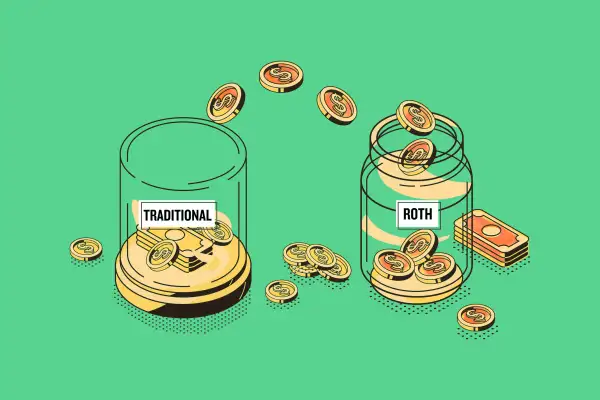Roth IRA Conversions Are Surging. Here's Why This Retirement Savings Strategy Is So Popular Right Now

When the coronavirus sent stocks tumbling in March, it was a perfect time to convert a traditional retirement account into a Roth. But if you didn’t act then, you didn’t miss your chance, experts say.
Roths differ from traditional retirement accounts in how they’re taxed. A traditional 401(k) or IRA allows investors to make tax-free contributions, deferring the taxes until the money is withdrawn. Roth IRAs are the opposite in that investors pay income taxes on the money as it goes in, not when it comes out. The benefits of Roth IRAs include that you can make early withdrawals from contributions without a penalty.
Conversions are having quite a moment. Fidelity Investments saw a 76% increase in the number of Roth IRA conversions in the first quarter of 2020 versus the first quarter of 2019, according to Melissa Ridolfi, vice president of Retirement and College Leadership at Fidelity Investments. The momentum appears to have continued into the second quarter: in the first four months of 2020 Fidelity has seen a 67% increase in the number of Roth conversions compared to the first four months of last year, Ridolfi adds.
When you convert a traditional IRA to a Roth, you pay income tax on the amount converted. (Taxes are due by April 15 of the following year, unless you owe estimated taxes, in which case you might have to pay some sooner.) These two factors will affect how much you owe: your account balance and your income tax bracket. Both of these might have gone down during the during the pandemic.
While stocks are up from their March lows, they are still down compared to January and February. In addition to rattling the market, the new coronavirus has sent unemployment rates surging. A staggering 42.6 million Americans have lost their job since the pandemic began.
If you’re among those who lost a job -– pushing you into a lower income tax bracket –- then it may be a good opportunity to convert to a Roth IRA, as the tax bill on your conversion will be lower, says Michael Joyce, president of financial planning and investment management firm Agili.
The pandemic also forced many businesses to shutter. For a business owner who has a taxable loss, a Roth conversion could be a way to eat some of the cost, according to Jason Deshayes, director of Tax Planning at Cook Wealth Management Group. The taxable loss can be used to offset other income (like wages) on a personal tax return. With the IRA conversion creating additional income, the owner could use the loss generated by the business against the IRA conversion. For example, if the owner has $50,000 in wages, a $25,000 allowable business loss and a $25,000 taxable Roth conversion, the loss and conversion offset one another, leaving the owner with $50,000 of income. They would effectively only pay tax on the wages they have, Deshayes says.
But just because conditions are favorable for a Roth conversion doesn't mean that it's the right move for everyone. If you’re in the prime of your career, you might benefit more from the current tax deduction of a traditional account. By contrast, if you’re a young person new to the job market, or believe you’ll be making more money in the future (pushing you into a higher tax bracket), it might be a smart move for you to convert.
Another caveat: if you don’t have the cash on hand to pay the taxes on the conversion outside of your IRA, it isn’t advisable to convert, Deshayes says. Withholding money from the conversion to pay taxes ends up diminishing the benefit of the conversion itself and could trigger unnecessary penalties, Deshayes says. If you are younger than 59½, you would owe an additional 10% penalty on the amount that's withheld for taxes.
It’s not only important to think about whether or not you will convert, but also how much. You don’t have to convert an entire IRA – just switch a portion that will not push you into a higher tax bracket, Joyce says. Retirees have to be careful that the income resulting from their Roth conversion doesn’t push them into a higher Medicare income bracket, meaning they would have to pay higher Medicare Part B (and possibly D) premiums. The good news is that, once you fully convert to a Roth IRA, you don't have to take required minimum distributions starting at age 72, and can leave that money in your account to grow tax-free for yourself in the future, or your heirs.
No one has a crystal ball to show where stocks are headed from here (in other words, when it will make even more sense to convert). But the decision depends on your specific situation and your goals for your money. If you want to convert and didn’t in March, you may still have a good opportunity to do so.
More from Money:
Protests Are Raging in America's Biggest Cities. So Why Is the Stock Market up?
